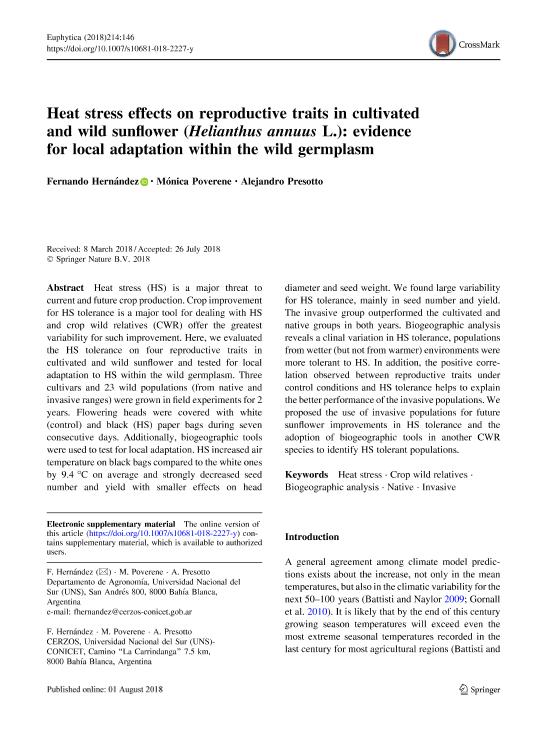Mostrar el registro sencillo del ítem
dc.contributor.author
Hernández, Fernando

dc.contributor.author
Poverene, María Mónica

dc.contributor.author
Presotto, Alejandro Daniel

dc.date.available
2019-10-29T15:39:23Z
dc.date.issued
2018-08-01
dc.identifier.citation
Hernández, Fernando; Poverene, María Mónica; Presotto, Alejandro Daniel; Heat stress effects on reproductive traits in cultivated and wild sunflower (Helianthus annuus L.): evidence for local adaptation within the wild germplasm; Springer; Euphytica; 214; 8; 01-8-2018; 146
dc.identifier.issn
0014-2336
dc.identifier.uri
http://hdl.handle.net/11336/87534
dc.description.abstract
Heat stress (HS) is a major threat to current and future crop production. Crop improvement for HS tolerance is a major tool for dealing with HS and crop wild relatives (CWR) offer the greatest variability for such improvement. Here, we evaluated the HS tolerance on four reproductive traits in cultivated and wild sunflower and tested for local adaptation to HS within the wild germplasm. Three cultivars and 23 wild populations (from native and invasive ranges) were grown in field experiments for 2 years. Flowering heads were covered with white (control) and black (HS) paper bags during seven consecutive days. Additionally, biogeographic tools were used to test for local adaptation. HS increased air temperature on black bags compared to the white ones by 9.4 °C on average and strongly decreased seed number and yield with smaller effects on head diameter and seed weight. We found large variability for HS tolerance, mainly in seed number and yield. The invasive group outperformed the cultivated and native groups in both years. Biogeographic analysis reveals a clinal variation in HS tolerance, populations from wetter (but not from warmer) environments were more tolerant to HS. In addition, the positive correlation observed between reproductive traits under control conditions and HS tolerance helps to explain the better performance of the invasive populations. We proposed the use of invasive populations for future sunflower improvements in HS tolerance and the adoption of biogeographic tools in another CWR species to identify HS tolerant populations.
dc.format
application/pdf
dc.language.iso
eng
dc.publisher
Springer

dc.rights
info:eu-repo/semantics/openAccess
dc.rights.uri
https://creativecommons.org/licenses/by-nc-sa/2.5/ar/
dc.subject
BIOGEOGRAPHIC ANALYSIS
dc.subject
CROP WILD RELATIVES
dc.subject
HEAT STRESS
dc.subject
INVASIVE
dc.subject
NATIVE
dc.subject.classification
Agronomía, reproducción y protección de plantas

dc.subject.classification
Agricultura, Silvicultura y Pesca

dc.subject.classification
CIENCIAS AGRÍCOLAS

dc.title
Heat stress effects on reproductive traits in cultivated and wild sunflower (Helianthus annuus L.): evidence for local adaptation within the wild germplasm
dc.type
info:eu-repo/semantics/article
dc.type
info:ar-repo/semantics/artículo
dc.type
info:eu-repo/semantics/publishedVersion
dc.date.updated
2019-10-22T17:43:57Z
dc.identifier.eissn
1573-5060
dc.journal.volume
214
dc.journal.number
8
dc.journal.pagination
146
dc.journal.pais
Alemania

dc.journal.ciudad
Berlin
dc.description.fil
Fil: Hernández, Fernando. Consejo Nacional de Investigaciones Científicas y Técnicas. Centro Científico Tecnológico Conicet - Bahía Blanca. Centro de Recursos Naturales Renovables de la Zona Semiárida. Universidad Nacional del Sur. Centro de Recursos Naturales Renovables de la Zona Semiárida; Argentina. Universidad Nacional del Sur. Departamento de Agronomía; Argentina
dc.description.fil
Fil: Poverene, María Mónica. Consejo Nacional de Investigaciones Científicas y Técnicas. Centro Científico Tecnológico Conicet - Bahía Blanca. Centro de Recursos Naturales Renovables de la Zona Semiárida. Universidad Nacional del Sur. Centro de Recursos Naturales Renovables de la Zona Semiárida; Argentina. Universidad Nacional del Sur. Departamento de Agronomía; Argentina
dc.description.fil
Fil: Presotto, Alejandro Daniel. Consejo Nacional de Investigaciones Científicas y Técnicas. Centro Científico Tecnológico Conicet - Bahía Blanca. Centro de Recursos Naturales Renovables de la Zona Semiárida. Universidad Nacional del Sur. Centro de Recursos Naturales Renovables de la Zona Semiárida; Argentina. Universidad Nacional del Sur. Departamento de Agronomía; Argentina
dc.journal.title
Euphytica

dc.relation.alternativeid
info:eu-repo/semantics/altIdentifier/url/https://link.springer.com/article/10.1007%2Fs10681-018-2227-y#citeas
dc.relation.alternativeid
info:eu-repo/semantics/altIdentifier/doi/http://dx.doi.org/10.1007/s10681-018-2227-y
Archivos asociados
